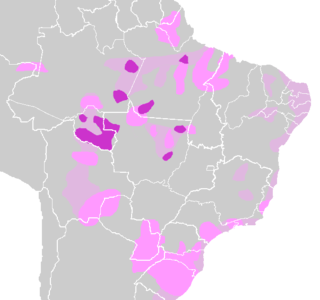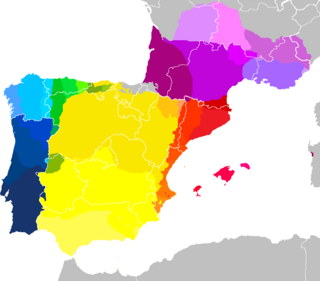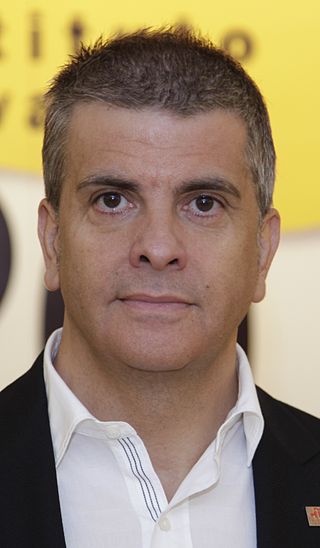
Portuguese is a Western Romance language of the Indo-European language family originating from the Iberian Peninsula of Europe. It is the official language of Portugal, Brazil, Cape Verde, Angola, Mozambique, Guinea-Bissau and São Tomé and Príncipe, and has co-official language status in East Timor, Equatorial Guinea, and Macau. Portuguese-speaking people or nations are known as "Lusophones". As the result of expansion during colonial times, a cultural presence of Portuguese speakers is also found around the world. Portuguese is part of the Ibero-Romance group that evolved from several dialects of Vulgar Latin in the medieval Kingdom of Galicia and the County of Portugal, and has kept some Celtic phonology.

The Tupi or Tupian language family comprises some 70 languages spoken in South America, of which the best known are Tupi proper and Guarani.
Portuguese dialects are the mutually intelligible variations of the Portuguese language in Portuguese-speaking countries and other areas holding some degree of cultural bond with the language. Portuguese has two standard forms of writing and numerous regional spoken variations, with often large phonological and lexical differences.

Portuñol or Portunhol is a portmanteau of the words portugués/português ("Portuguese") and español/espanhol ("Spanish"), and is the name often given to any non-systematic mixture of Portuguese and Spanish. Close examination reveals it to be "a polyvalent term (portuñol/portunhol) used to describe a wide range of phenomena, including spontaneous contact vernaculars in border regions, errors produced by speakers attempting to speak the second language (L2) correctly, and idiosyncratic invented speech designed to facilitate communication between the two languages."

European Portuguese, also known as Portuguese of Portugal, Iberian Portuguese, and Peninsular Portuguese, refers to the dialects of the Portuguese language spoken in Portugal, Angola, Mozambique, São Tomé and Príncipe and Guinea-Bissau. The word "European" was chosen to avoid the clash of "Portuguese Portuguese" as opposed to Brazilian Portuguese.

Leonese is a set of vernacular Romance language varieties currently spoken in northern and western portions of the historical region of León in Spain and a few adjoining areas in Portugal, where it is known as Mirandese, sometimes considered another language. In the past, it was spoken in a wider area, including most of the historical region of Leon. The current number of Leonese speakers is estimated at 20,000 to 50,000.

The Nadahup languages, also known as Makú (Macú) or Vaupés–Japurá, form a small language family in Brazil, Colombia, and Venezuela. The name Makú is pejorative, being derived from an Arawakan word meaning "without speech". Nadahup is an acronym of the constituent languages.

Uruguayan Portuguese, also known as fronteiriço and riverense, and referred to by its speakers as portunhol, is a variety of Portuguese in South America with heavy influence from Rioplatense Spanish. It is spoken in north-eastern Uruguay, near the Brazilian border, mainly in the region of the twin cities of Rivera (Uruguay) and Santana do Livramento (Brazil). This section of the frontier is called "Peace Border", because there is no legal obstacle to crossing the border between the two countries.

Barranquenho is a Romance linguistic variety spoken in the Portuguese town of Barrancos, near the Spanish border. It is a mixed language, and can be considered either a variety of Portuguese heavily influenced by the Spanish dialects of neighbouring areas in Spain in Extremadura and Andalusia, or a Spanish dialect heavily influenced by Portuguese.

Francisco Moreno-Fernández is a Spanish dialectologist and sociolinguist.

The Galician Language Association is a reintegrationist association established in 1981 which seeks the full restoration ("re-integration") of Galician as a branch of Galician-Portuguese. It also aims for the official incorporation of Galicia into the Community of Portuguese Language Countries. It was originally formed by professional linguists only, although membership was soon made available to individuals showing an interest in the promotion of Galician culture, language, and the ideas of linguistic reintegrationism.
Antxon Olarrea is a Spanish syntactician and a professor of linguistics within the Department of Spanish and Portuguese at the University of Arizona. He is the author of several books and articles on theoretical linguistics and Spanish morphology and syntax. He also has a solid career as an educator and is the recipient of numerous national teaching awards in Linguistics.
Willem Leo Marie (Leo) Wetzels is a full professor at the Vrije Universiteit Amsterdam in the Netherlands and Directeur de recherche at Laboratoire de Phonétique et Phonologie (LPP), CNRS/Sorbonne-Nouvelle in Paris. He is Editor-in-Chief of Probus International, the Journal of Latin and Romance Linguistics.
John M. Lipski is an American linguist who is most widely known for his work on Spanish and Portuguese dialectology and variation. His research also focuses on Spanish phonology, the linguistic aspects of bilingualism and code-switching, African influences on Spanish and Portuguese, and pidgin and creole studies. He is currently the Edwin Erle Sparks Professor of Spanish Linguistics in the Department of Spanish, Italian, and Portuguese at the Pennsylvania State University. He previously served as the head of the same department from 2001 to 2005.

Mark E. Davies is an American linguist. He specializes in corpus linguistics and language variation and change. He is the creator of most of the text corpora from English-Corpora.org as well as the Corpus del español and the Corpus do português. He has also created large datasets of word frequency, collocates, and n-grams data, which have been used by many large companies in the fields of technology and also language learning.
Antônio Roberto Monteiro Simões is a Brazilian-born linguist interested in the phonetics and phonology of the Romance languages. Simões is an associate professor of Spanish and Portuguese linguistics at the University of Kansas, in Lawrence, USA, where he teaches Hispanic linguistics. He has authored books, textbooks and articles contrasting the Portuguese and Spanish languages. Simões is currently conducting research work on speech models and foreign language learning models, especially in relation to phonetics and phonology. Simões work on modeling is a continuation of his Ph.D. thesis; an adaptation of the late Dennis Klatt's 1976 pioneering model to predict duration in connected speech.

Aldyr Garcia Schlee was a Brazilian writer, journalist, translator, illustrator, and professor.
The bibliography of code-switching comprises all academic and peer-reviewed works on the topic of code-switching. It is sorted by category, then alphabetically.

Terrell A. Morgan is an American linguist and professor of Hispanic linguistics at Ohio State University. He is a phonologist and dialectologist specializing in documenting linguistic diversity and developing methods for students, teachers, and other linguists to experience the sounds and structures of Spanish in the real world. His research includes work on phonetic and morphosyntactic variation on topics such as rhotics, voseo, the current usage of vosotros, and pedagogical approaches to phonetics.
Celso Álvarez Cáccamo, born in Vigo, Galicia, Spain in 1958, is an author and sociolinguist.












